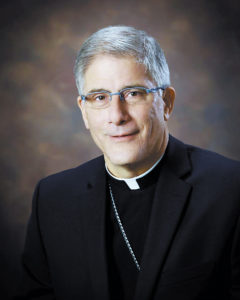
Bishop Joseph R. Kopacz
By Bishop Joseph Kopacz
Christmas is a gift that keeps on giving, not only for one day, but for an OCTAVE of eight days, and a season of 19 days through the Baptism of the Lord. So please, play your Christmas hymns up through the Feast of the Epiphany on January 6. The following quotes are taken from daily reflections during the OCTAVE of Christmas that reflect the inspired wisdom of the ages.
Christmas Day “Christians, remember your dignity.” – Saint Leo the Great, Pope
Dearly beloved, today our Savior is born; let us rejoice. Sadness should have no place on the birthday of life. The fear of death has been swallowed up; life brings us joy with the promise of eternal happiness…No one is shut out from this joy; all share the same reason for rejoicing. Let the saint rejoice as he sees the palm of victory at hand. Let the sinner be glad as he receives the offer of forgiveness. Let the pagan take courage as he is summoned to life.
The Armament of Love – Saint Fulgentius of Ruspe
Our king, despite his exalted majesty, came in humility for our sake; yet he did not come empty handed. He brought his soldiers a great gift that not only enriched them but also make them unconquerable in battle, for it was the gift of love which was to bring men and women to share in his divinity. He gave of his bounty, yet without any loss to himself. In a marvelous way he changed into wealth the poverty of his faithful followers while remaining in possession of his own inexhaustible riches.
Life Itself Was Revealed in the Flesh – Saint Augustine
“We proclaim to you what we have seen and heard.” Gospel of John Make sure you grasp the meaning of these words. The disciples saw our Lord in the flesh, face to face; they heard the words he spoke, and in turn they proclaimed the message to us. So, we also have heard, although we have not seen. Are we less favored than those who both saw and heard? If that were so, why should John add: so that you may have fellowship with us? They saw, and we have not seen; yet we have fellowship with them, because we and they share the same faith. And our fellowship is with God the Father and Jesus Christ his Son. And we write this to you to make your joy complete — complete in that fellowship, in that love and in that unity.
“They cannot speak and yet they bear witness to Christ.” – Saint Quodvultdeus
A tiny child is born, who is a great king. Wise men are led to him from afar. They come to adore one who lies in a manger and yet reigns in heaven and on earth. When they tell of one who is born a king Herod is disturbed. To save his kingdom he resolves to kill him, though if he would have faith in the child, he himself would reign in peace in this life and forever in the life to come. Why are you afraid, Herod, when you hear of the birth of a king? He does not come to drive you out, but to conquer the devil. But because you do not understand this you are disturbed and, in a rage, and to destroy one child whom you seek, you show your cruelty in the death of so many children…The children cannot speak yet they bear their witness to Christ. They cannot use their limbs to engage in battle, yet already they bear off the palm of victory.
In the fullness of time the fullness of humanity appeared. – Saint Bernard, Abbot
How could he have shown his mercy more clearly than by taking on himself our condition? For our sake the Word of God became as grass. What better proof could he have given of his love? Scripture says: Lord, what is humanity that you are mindful of him; why does your heart go out to him? The Incarnation teaches how much God cares for us and what he thinks and feels about us. We should stop thinking of our own sufferings and remember what he has suffered.
Let us think of all the Lord has done for us, and then we shall realize how his goodness appears through his humanity. The more he lowered himself for me, the dearer he is to me. He has given us a most wonderful proof of his goodness by adding humanity to his own divine nature.
The Word took our Nature from Mary – Saint Augustine
The Apostle tells us: The Word took to himself the sons of Abraham, and so had to be like his brothers in all things. Jesus had then to take a body like ours. This explains the fact of Mary’s presence; she is to provide him with a body of his own to be offered for our sake. Scripture records her giving birth and says: She wrapped him in swaddling clothes. Her breasts, which fed him, were called blessed. Sacrifice was offered because the child was her firstborn. Gabriel used careful and prudent language when he announced his birth. He did not speak of what would be born in you to avoid the impression that a body would be introduced into her womb from outside; he spoke of “what will be born from you” so that we might know by faith that her child originated within and from her.
